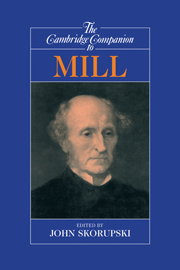Book contents
- Frontmatter
- Introduction
- 1 Mill on language and logic
- 2 Mill, mathematics, and the naturalist tradition
- 3 Mill on induction and scientific method
- 4 Mill, phenomenalism, and the self
- 5 Mill on religion
- 6 Mill on psychology and the moral sciences
- 7 Mill's utilitarianism
- 8 Mill's political economy
- 9 Civilization and culture as moral concepts
- 10 Democracy, socialism, and the working classes
- 11 The subjection of women
- 12 Mill and the Classical world
- 13 The reception and early reputation of Mill's political thought
- 14 Mill in a liberal landscape
- Guide to further reading
- Bibliography
- Index
9 - Civilization and culture as moral concepts
Published online by Cambridge University Press: 28 May 2006
- Frontmatter
- Introduction
- 1 Mill on language and logic
- 2 Mill, mathematics, and the naturalist tradition
- 3 Mill on induction and scientific method
- 4 Mill, phenomenalism, and the self
- 5 Mill on religion
- 6 Mill on psychology and the moral sciences
- 7 Mill's utilitarianism
- 8 Mill's political economy
- 9 Civilization and culture as moral concepts
- 10 Democracy, socialism, and the working classes
- 11 The subjection of women
- 12 Mill and the Classical world
- 13 The reception and early reputation of Mill's political thought
- 14 Mill in a liberal landscape
- Guide to further reading
- Bibliography
- Index
Summary
Much has been written, admiring and dismissive, on Mill the preeminent champion of individuality. And appropriately so; On Liberty is likely to remain the most widely known of his social and political writings, one that seems never to lose its power to stimulate both thought and emotion. Analysis of Utilitarianism and his other writings on ethical questions properly centres on what he says about individual motivation and behaviour. And as one of the greatest of Classical economists, Mill was in the tradition whose analysis and values were based on the individual's selfinterest. This insistent concern for individuality should not, however, preclude attention to his portrayal and evaluation of humans as social animals.
It is significant - to touch only on the most contentious area, economics - that the full title of Mill's major treatise is Principles of Political Economy with some of their applications to social philosophy. And that after finishing his other great treatise, A System of Logic, he told Alexander Bain that his next project was a work on ethology (Bain 1901, 159; Bain 1882, 78-79), one that L. S. Feuer thought would have been a "masterpiece of sociology" (Feuer 1976, 87). What he had in mind was an analysis and exposition of "the science which corresponds to the art of education; in the widest sense of the term, including the formation of national or collective character as well as individual" (System of Logic, CW VIII:869). Though he never wrote this work, it is not fanciful to look for his views of civilization and culture in this context.
- Type
- Chapter
- Information
- The Cambridge Companion to Mill , pp. 338 - 371Publisher: Cambridge University PressPrint publication year: 1998
- 16
- Cited by

